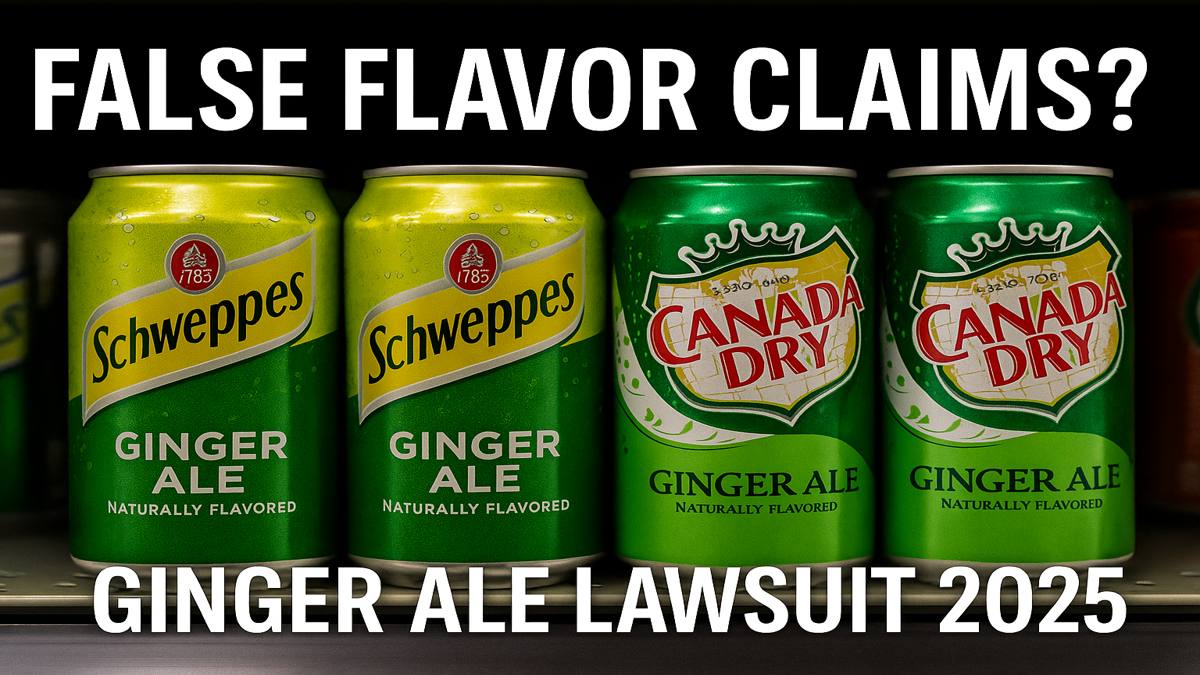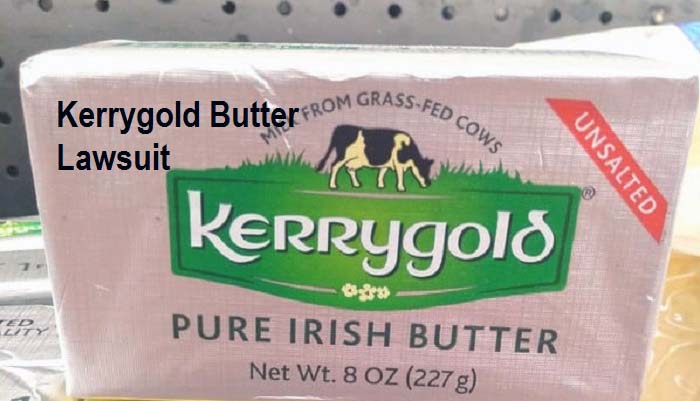You deserve to know what’s in your drink. That’s what the Ginger Ale Lawsuit is all about. It claims that Schweppes and Canada Dry ginger ales misled customers about their contents. The suit alleges these drinks claim to be “naturally flavored” but include synthetic ingredients. Consumers paid premium prices, believing they were buying something natural. That’s now under legal fire.
Who Filed the Case and What Sparked It
Lillian Elliot took legal action. She filed a class-action complaint in federal court in California in October 2024. She accuses Keurig Dr Pepper, the parent company behind Schweppes and Canada Dry, of deceptive labeling.
According to her complaint, the drinks feature labels that highlight “natural ginger flavor.” But lab tests showed the presence of synthetic dl-malic acid, which mimics a sour, tangy flavor similar to ginger. This ingredient is chemically made and not derived from natural sources. Customers, like Elliot, argue that they trusted the label and overpaid. They didn’t know they were drinking synthetic additives.
Key Products Named in the Ginger Ale Lawsuit
The lawsuit names several drinks under the Schweppes and Canada Dry brands. These drinks are popular and widely available in the United States. The list includes:
- Schweppes Diet Ginger Ale
- Schweppes Raspberry Ginger Ale
- Schweppes Black Cherry Ginger Ale
- Schweppes Dry Grape Ginger Ale
- Canada Dry Diet Ginger Ale
- Canada Dry Zero Sugar Ginger Ale
- Canada Dry Lemonade Ginger Ale
- Canada Dry Cranberry Diet Ginger Ale
All of these products share something in common. Each one features the phrase “natural flavor” on the front label. None of them mention synthetic dl-malic acid anywhere on the packaging. You might have one of these drinks at home. Check the label and ingredient list. That’s what this case is challenging—what’s said versus what’s hidden.
Legal Grounds for the Claims
The Ginger Ale Lawsuit is based on several laws designed to protect consumers. These laws make it illegal to mislead customers about what a product contains. Here are the main legal claims:
- California Consumer Legal Remedies Act: This law protects buyers from deceptive practices.
- California Unfair Competition Law: It bans business practices that are unfair or misleading.
- California False Advertising Law: This law prohibits any label or ad that is false or deceptive.
- Massachusetts Consumer Protection Law: It ensures truthful business conduct in marketing.
- Breach of Warranty: The drinks did not meet the expectations set by the labels.
- Fraud by Omission: The manufacturer left out important facts about synthetic ingredients.
- Negligent Misrepresentation: The company gave incorrect or incomplete information.
Together, these claims create a strong case. The lawsuit argues that customers would not have bought the drinks—or paid as much—if they knew the truth.
What the Lab Tests Revealed
Testing played a key role in launching this lawsuit. An independent lab tested multiple samples of the named products. The results showed that dl-malic acid was present in all of them. This acid is made in a factory. It does not occur naturally in fruits or spices. When used in food and drinks, it enhances tartness. That makes it a perfect flavoring tool—when disclosed.
But the drinks labeled themselves as “naturally flavored.” That’s where the problem lies. Federal rules require companies to label products as “artificially flavored” if they use synthetic taste enhancers. These drinks did not meet that rule. That’s why they’re now in legal trouble.
What Makes This Case Different from the Past
This is not the first lawsuit of its kind. Canada Dry faced similar complaints in 2019. In that earlier case, the company settled for over $11 million. They had to stop using the phrase “Made from Real Ginger.” Consumers who joined the suit received up to $40 depending on how much they bought.
This new Ginger Ale Lawsuit is different. It focuses on hidden synthetic chemicals instead of misleading slogans. It shows that even after label changes, companies still walk a thin line. This case could set a new standard. If the plaintiffs win, manufacturers might need to change not just their words but also their ingredients.
Who Can Join the Ginger Ale Lawsuit
You might be eligible. The case targets people in the United States who bought Schweppes or Canada Dry ginger ale since November 2018. You do not need to live in California or Massachusetts to qualify. The case may expand to include buyers in all states.
You may need to show receipts if a settlement occurs. If you don’t have proof of purchase, some cases offer lower-tier refunds based on trust-based claims. Stay informed. New updates may allow you to register interest, submit claims, or even request compensation. Don’t wait for a check in the mail. Be proactive.
What the Company Might Say in Its Defense
Keurig Dr Pepper has not made a public statement about this case. But companies in similar lawsuits often use the same defenses. They may say:
- The ingredient is safe and legal to use.
- The label follows FDA rules.
- Consumers should read the full ingredient list.
- “Natural flavor” is a marketing term, not a promise.
These defenses may not hold up. If the court finds the label misleading, the company could face fines, product recalls, or payouts. This isn’t just about chemistry. It’s about consumer trust.
What Consumers Like You Can Do Right Now
You don’t need to be a lawyer to protect your rights. Start by checking your pantry. If you bought any of the products listed in this case, take notes. Keep receipts if you have them. Take pictures of the labels if you find unopened bottles or cans. Sign up for updates from class action websites. Many allow you to get alerts when there’s movement in the case.
If a settlement is offered, act fast. Most class-action payments come with deadlines. Missing them could mean losing your refund. Spread the word. Many people still trust these labels. Let friends and family know what’s happening.
How This Case Could Shape the Future
This case might go far beyond one drink. It could influence how companies label foods and beverages across the board. If this suit succeeds:
- Labels may get clearer.
- Synthetic ingredients might need disclosure.
- Price premiums may drop if products lose their “natural” status.
You should care. Every shopper wants honest labels. Every consumer deserves the truth.
Detailed Table of the Ginger Ale Lawsuit Facts
| Aspect | Details |
|---|---|
| Plaintiff | Lillian Elliot |
| Defendant | Keurig Dr Pepper, Inc. |
| Court | U.S. District Court – Eastern District of California |
| Products Named | Schweppes and Canada Dry ginger ale variants |
| Date Filed | October 2024 |
| Main Complaint | False labeling of “natural flavor” |
| Ingredient in Question | dl-malic acid (synthetic) |
| Legal Claims | False advertising, fraud, warranty breach, consumer protection |
| Laws Referenced | California and Massachusetts consumer laws |
| Who Qualifies | U.S. buyers since November 2018 |
| Current Case Status | Active, no settlement announced yet |
| Past Related Case | 2019 Canada Dry “Real Ginger” settlement ($11.2M) |
| Potential Settlement Outcome | Refunds, label changes, public disclosures |
What Happens Next in the Case
The lawsuit is still in the early phase. Court filings are ongoing. Discovery, if approved, would allow both sides to collect evidence. This may include internal company emails, test results, or product design documents. The goal is to show whether the company knew the label was misleading.
If a settlement comes, it could include:
- Financial payouts to consumers
- Changes to labeling on all products
- Disclosures about synthetic ingredients
- Public awareness efforts
The court will decide if the class is certified. If that happens, the case may represent thousands or millions of buyers.
What to Watch in the Coming Months
This case could reach trial or settle out of court. Either outcome will impact how food and beverage companies operate. Watch news outlets. Check class-action platforms. Stay aware of your rights as a shopper. If nothing else, this case teaches one lesson: read the label. Don’t assume that “natural” means what it claims. You can’t control what a company puts in its product. But you can hold it accountable when it breaks your trust.
Final Takeaway on the Ginger Ale Lawsuit
The Ginger Ale Lawsuit challenges what many took for granted. People bought Schweppes and Canada Dry believing in “natural flavor.” Now they learn synthetic chemicals may be in their drink. That’s not just disappointing. It’s deceptive. You should expect honesty from every brand you support. This lawsuit pushes for that. Follow the case. Know your rights. Claim what’s fair. The Ginger Ale Lawsuit could change more than just what’s in your soda. It could change the rules of food labeling everywhere.
Ayesha Awais is a content writer for JudicialNexus.com, covering accident reports, injury-related news, lawsuits, and public safety updates. All content is informational in nature and based on publicly available sources.




